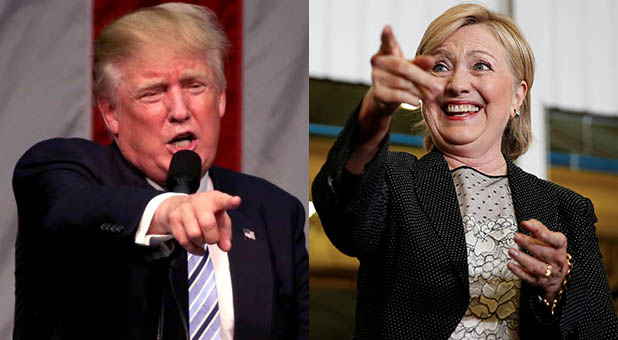How the Jewish Vote Might Swing the 2016 Election
Prior to the 2004 presidential election, the Jewish vote in the U.S., like many of the minority voting blocs, was decidedly one-sided for Democrat candidates.
Then, in his re-election bid that year, President George W. Bush won nearly three-fourths of the Orthodox Jewish vote. While Democrats still commanded the attention of nearly three-fourths of American Jews overall, Republicans consistently have grabbed three-fourths of the Orthodox vote in every presidential election since.
But will it happen again in 2016? And can Donald Trump carve into Hillary Clinton’s built-in lead with secular Jews?
According to Nathan Diament, executive director of the Orthodox Union’s Advocacy Center—the OU’s non-partisan public policy division—that’s a difficult question to answer with absolute certainty. As he put it, it’s an “interesting dynamic” that is unique to the 2016 presidential race.
First, it’s important to note that most American Jews are more secular, and not as affiliated or engaged with the rest of the Jewish community. They are typically aligned with liberal Democrats and are generally interested in advancing a liberal agenda.
Orthodox Jews, on the other hand, are far more engaged and interconnected, and according to decades of data, they turn out for elections at rates “well north of 70 percent,” especially in key battleground states, such as Ohio and Florida. Diament said that in those states, their turnout can have a “disproportional impact,” and can easily swing a state in one candidate’s direction.
The problem, he added, is that the Jewish community doesn’t know which Hillary Clinton or Donald Trump they’re actually voting for. Both candidates have a “mixed record,” particularly when it comes to the issue most important to Jewish voters: Israel’s security.
“As a senator from New York, Hillary Clinton was a very staunch supporter, and that’s reflected in her voting record,” Diament said. “But, as secretary of state, where she was advancing the Obama Administration’s foreign policy, which she said she supported, and that’s been viewed as very negative toward Israel.
“On the other hand, with Donald Trump, you have someone who—in the course of this campaign cycle—has said some very contradictory things about Israel. At first, he said he was going to be neutral when it comes to Israel and her enemies, and there’s still video of that out there. Then, he went to AIPAC and gave a speech that was very pro-Israel.”
He added that a secondary—perhaps surprising—issue is also fueling the mixed view of Trump’s relationship. That issue is the GOP candidate’s call for limiting Muslim entry to the U.S.
“It’s not that we don’t want national security—we absolutely do—but as a minority faith community, there was a lot of discomfort over how it was phrased initially,” he said. “If he had framed it as he has more recently—that he wants to exclude potential terrorists—I think it would have been more readily accepted.”
Diament said there’s “a lot of assessment going on” with regard to the two candidates, and if either of them wants to have a breakout with the Jewish vote, they need to reach out to the Jewish community. He said direct engagement will be most vital to winning the Jewish vote in 2016.
“They’re going to have to engage directly, either themselves or with high-level surrogates to make their case to the community,” he said. “It’s reasonable to expect Hillary to do the same as in past years in terms of support from secular Jews, but the Orthodox vote is still very unpredictable at this point.”















































